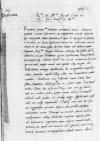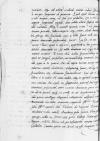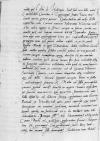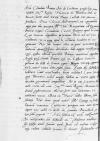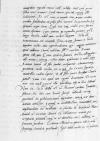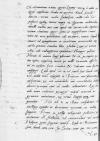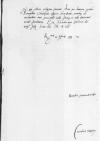List #2846
Cornelis DE SCHEPPER do Ioannes DANTISCUSHarderwijk, 1545-07-17
Regest polski:
Opisuje przebieg dwumiesięcznej podróży z dworem królowej [Mary of Hungary] z Brabancji do Vollenhove, dokąd dotarł 10 lipca [1545]. Tegoż dnia otrzymał list Dantyszka, nadany 11 maja.
De Schepper usprawiedliwia swoje trzyletnie milczenie wojną. Trzy listy, które otrzymał w tym czasie od Dantyszka [IDL 2621, IDL 6697 (lost), IDL 6925 (lost)] były dla niego pociechą wśród trudów i niebezpieczeństw.
Opisuje skutki wojny w Niderlandach: w 1544 roku zginęli René [de Châlon], [Jan] de Halewijn i szwagier De Scheppera Cornelis van Zegherscapelle. W roku 1543 w bitwie pod Kempekoel (in agro Zittardiensi) ciężko ranny został pasierb De Scheppera Matthias Laurijn, który jednak wyzdrowiał i wrócił do służby. Obecnie towarzyszy sekretarzowi cesarskiemu Gerardowi Veltwijck w poselstwie do sułtana [Suleiman I the Magnificent].
De Schepper informuje Dantyszka o okolicznościach śmierci Godschalka Ericksena. Przekazuje pozdrowienia od nielicznych, pozostałych przy życiu przyjaciół: Maximiliaana van Egmond-Buren, Claude’a Bouton, Hendrika van Witthem oraz Petrus’a Clericus’a, który był częstym gościem Dantyszka w czasach koronacji cesarskiej w Bolonii [1530]. Sugeruje Dantyszkowi odwzajemnienie pozdrowień w kolejnym liście.
Zawiadamia, że obecnie w Niderlandach panuje pokój, mimo że dwaj królowie [Henry VIII Tudor, Francis I de Valois] spierają się o Boulogne-sur-Mer. Cesarz przebywa na sejmie w Wormacji. Życzeniem cesarza jest zgoda wśród zwaśnionych Niemców. De Schepper rzadko bywa na dworze cesarskim, służy jedynie królowej Marii [of Hungary].
Syn De Scheppera [Cornelis De Schepper jr.] studiuje w Leuven, córka [Anne] jest w domu przy matce, a pasierbica [Catharina Laurijn] poślubiła [Wulfaerta] van Borselle i ma z nim syna.
De Schepper otrzymał od Theodoryka [of Vollenhove] wieści z Polski. Zaskoczyła go informacja o powrocie Dantyszka na dwór. Spodziewał się, że Dantyszek skoncentruje się raczej na zwalczaniu herezji. Donosi o kryzysie religii w Niderlandach. Niepokoi go zwłaszcza działalność Jana Łaskiego [jr.] we Fryzji Wschodniej pod rządami [Anny von Oldenburg], wdowy po hrabim Enno [Cirksena]. Pod wpływem Łaskiego, pomimo napomnień ze strony sąsiadów z drugiego brzegu rzeki Ems, zaprzestano tam odprawinia mszy i innych nabożeństw. De Schepper opisuje spory doktrynalne Łaskiego, Menno Simonsa i Davida Jorisa. Wszystkich ich określa jako anabaptystów i zauważa, że ich zwolennicy trwają w błędach mimo licznych wyroków śmierci. Walkę z nimi porównuje do walki z hydrą.
De Schepper słyszał, że wielu jego rodaków, zrzuciwszy szaty duchowne, zbiegło do Prus. Ostrzega, że skutkiem mogą być nieszczęścia, podobne jak w Niderlandach. Przeczuwa, że w Niemczech ostatecznie zwyciężą zmiany i wyraża nadzieję, że nie rozprzestrzenią się one dalej.
Donosi, że we Francji pod wpływem Włochów kiełkuje ateizm. O Hiszpanach nie potrzebuje Dantyszka informować. Nie w pełni orientuje się w sytuacji w Anglii. W Szkocji sympatie religijne są podzielone. De Schepper prosi Boga o zgodę między władcami chrześcijańskimi i o ducha, potrzebnego im do zaradzenia nieszczęściom.
| odebrano Schmolainen (Smolajny), 1545-10-13 Rękopiśmienne podstawy źródłowe:
Publikacje:
| ||||||||||||||
Tekst + aparat krytyczny + komentarz Zwykły tekst Tekst + komentarz Tekst + aparat krytyczny
Reverendissimo et illustrissimo Praesuli et Domino, domino
Reverendissime et illustrissime Praesul et Domine, domine et pater honorandissime et observandissime.
Praemissa paratissima oblatione servitiorum meorum.
Diuturno quodam veterno laborantem et magnitudine socordiae deplorata spe emergendi plane obrutum et oppressum expergefecere quasique e tenebris in lucem explicuere cf.
Quo tamen vultu, Pater, has aspicies? Neque enim aut ego dicere, aut tu credere potes, quam meum istud triennale silentium mihi pudori sit, utcumque magis infelicitati quam ulli meae culpae imputandum. Postquam enim aut Dei ira ita exigentibus peccatis nostris, aut fatali quadam ordinatione vicini principes in excidium patriae nostrae conspiravere nobisque
cf. Adagia 804 ⌊Diomedea necessitascf. Adagia 804 ⌋ imposita fuit ad defensionem cogitationes omnes nostras convertendi, protinus ita apud me excussa est officiorum amicitiarumque veterum memoria, ut quantumvis subinde conarer illorum
recordari atque ad solita scribendi munia redire, id tamen a me ipso imperare non potuerim. Quid, quod litteras ad te scribi inceptas iamque ad finem fere perductas non semel deserere coegerit importunum negotium, dum subito aliorum imperiis subiecto alio evolandum illaeque e manibus eiciendae erant? Ut interim taceam pericula, labores corporis atque animi, cladem domesticam et pleraque alia incommoda, quae a belli initio mihi inter paucos haurienda perferendaque fuere. Quo fit, ut non verear, Pater, apud te asserere, quantumvis in hoc genere officii delictum obmissumve sit, id nulla devotionis meae erga te diminutione accidisse. Etenim Deum testor immortalem tui apud me integram, perfectam sacrosanctamque memoriam, cf.
Ut autem paucis intelligas aliquantam calamitatum nostrarum seriem: damnanda haec bella novissima rapuerunt illustrem
Proinde ex veteribus tibi notis pauci supersunt, qui tamen honorificam tui mentionem iucundamque memoriam renovare non desinunt apudque me insteterunt, ut se de meliore nota tibi commendarem. Principio illustris dominus
Nos hoc tempore alta in pace versamur (quam diuturnam optamus) inter dissidentes duos magnis viribus potentiaque
Duos ex
De vestratibus autem abunde ex
Et certe non uno mali genere illic pluribusque aliis in locis laboratur, nam et
Quid apud vos in re simili fiat, haud satis scio, audio tamen refugium in
Haec ad te, mi Pater, confidenter, ut intelligas, quanto in discrimine versemur sic undique impetiti. Etenim in
Ex
Reverendissimae et Illustrissimae Dominationis Vestrae humilis inservitor et filius
[1 ] Cisamasam – on this (i.e. West) side of the
[3 ] ‘Battle at the Kempekoel’ (also written: Kemperkoel, Kempe(r)koul), also known as the ‘Battle of Sittard’ or ‘Battle of the Kollenberg’, 24 March 1543. The troops of Emperor Charles V, commanded by Philippe de Croÿ, were defeated by the troops of Guelders and Cleves, commanded by Diderik Hoen, Lord of Arcen. Kemperkoel is the toponym of a field near Sittard, a town in the Duchy of Jülich (now in the province of Limburg, the Netherlands) (OBERDORF)
[4 ]
[5 ] Count Enno II of East Frisia died on 24 September 1540
